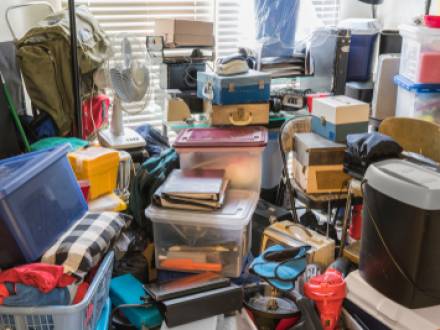My Spouse is a Hoarder – Will This Affect Custody Decisions?
 It is estimated that between 2 and 6 percent of the U.S. population suffers from hoarding disorder. Hoarding disorder appears to affect both genders equally and is believed to be universal, affecting all cultures, races, and ethnicities across the globe. However, older adults are disproportionately affected, with about three times more hoarders between the ages of 55 and 94.
It is estimated that between 2 and 6 percent of the U.S. population suffers from hoarding disorder. Hoarding disorder appears to affect both genders equally and is believed to be universal, affecting all cultures, races, and ethnicities across the globe. However, older adults are disproportionately affected, with about three times more hoarders between the ages of 55 and 94.
Hoarding behaviors often begin to emerge in the teen years – between ages 11 and 15. When the hoarding disorder begins this early, the symptoms start to interfere with everyday life by the time the individual is in his or her mid-20s. By the mid-30s, there is significant impairment from the hoarding disorder, which is likely to worsen through the years unless the individual seeks mental health treatment.
About 75 percent of those with hoarding disorder have other mental health conditions, like OCD, a major depressive disorder, a social phobia, or a social anxiety disorder. Whether hoarding will be a disqualifier in custody and visitation issues depends on whether the judge believes the hoarding behaviors place your child in danger. If you are dealing with a difficult child custody issue, it is a good idea to speak to a knowledgeable Fort Worth, TX child custody lawyer.
What Makes a Parent Unfit in Texas?
Parental fitness in Texas is based on the best interests of the child. The court will consider the following factors when considering a parent’s fitness:
- The parent’s ability to provide a stable environment.
- Whether the parent is willing to promote a positive relationship between the child and the other parent
- The parent’s mental and physical health
- Whether the parent has a history of domestic violence or child abuse
- Whether the parent has a history of child neglect
- Whether the parent has a history of felonious behavior
- Whether the parent has a history of substance abuse
- Whether the parent has the ability to effectively co-parent
- Any other behaviors that could potentially place the child at risk.
The court must also determine whether the parent’s home is unstable, meaning it is harmful or detrimental to the child’s physical, emotional, or mental well-being.
What Must a Parent with a Mental Illness Show the Court?
Since hoarding is considered a mental disorder, the court will evaluate the parent’s mental health based on his or her ability to meet the child’s needs and provide a nurturing environment. The parent in question must show the court that his or her mental illness is being managed through medication, therapy, or both. If the hoarding parent has not sought help for the disorder, and if the home is considered unstable because of the hoarding, then the parent with the hoarding disorder could be denied custody or visitation.
Hoarding is the obsessive need to acquire a significant amount of possessions, even when those items are worthless, hazardous, or unsanitary. Compulsive hoarding impairs the ability to live normally and could limit a child’s ability to sleep, shower, cook, or even remain mobile. Hoarding can directly affect the health and safety of children visiting or residing in the home.
Hoarding is a complex mental illness that may require extended mental health treatment and supervision. If the court requires that the house be decluttered for the sake of the child, it may also require regular reviews to ensure the home remains clean and safe for the child. If the hoarding parent is unwilling to seek treatment or rid his or her home of dangerous debris, that parent may be given limited or even supervised visitation with the child.
Contact a Fort Worth, TX Child Custody Attorney
If you are worried about your child visiting his or her other parent who is a hoarder, you should discuss this issue with your attorney. The judge may require photographs of the parent’s home and witness testimony when determining whether it is unsafe. Speaking to a Fort Worth, TX child custody lawyer from The Law Office of J. Kevin Clark P.C. is a positive step to take for this type of situation. Our attorneys fully understand the stress of divorce and all the accompanying issues. Call 817-348-6723 to schedule your free consultation.








